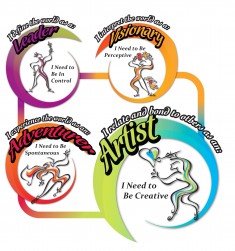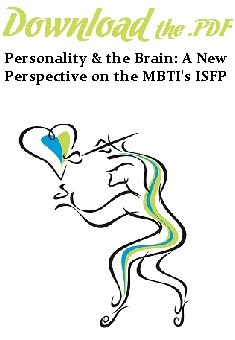Personality & the Brain - A New Perspective on the MBTI's ISFP
Personality & the Brain - A New Perspective on the MBTI's ISFP
Through the lens of the Striving Styles, each of the Myers-Briggs (MBTI®) 16 Types comes alive. Discover which quadrant of the brain the ISFP prefers to use, what the predominant, innate psychological need that drives the ISFP's behavior is, as well as how an ISFP can leverage their whole brain in order to develop and achieve their potential.
Four Quadrant Model of the Brain
The SSPS shows that each of the four quadrants of the brain has their own role, or function, to play in our personality and our consciousness. Based on Jung's Theory of Psychological Type, we are hard-wired to prefer one function or quadrant over the others and we use each quadrant or function in either an inwardly or an outwardly way.
The ISFP's Predominant Striving Style is the Artist, which is rooted in the right emotional brain (Jung's Feeling function) and focused internally. The purpose of the right emotional brain is to have emotional experiences. It focuses on present moment experiences as they relate to past emotional memories, and is able to use imagination or memory to produce feelings on demand. The most subjective part of the brain, it decides the value, attractiveness or aversiveness of an event, object, or situation; meaning, it figures out whether we like something or not. It compares and judges what is being experienced and generates feelings about it based on those judgments. Because we are all attracted to and repelled by different things, this subjective valuing is unique to each person.
The right emotional brain doesn’t know why it feels what it feels, it only knows what it feels, and feelings are more important than anything else going on. The holistic nature of this part of the brain means that it doesn’t separate what is felt from itself, or feeling from fact. If it feels it, it must be true. It also seeks to create harmony and is easily pulled-off center by emotional conflict. It will focus on restoring harmony by adapting behavior or emotions or expecting others to adapt theirs during disagreements or in emotional climates. so.
Drivers of Human Behavior: Needs & Emotions
Each of us is driven by powerful, instinctual needs and have been since birth. These needs are a source of motivation and influence our behavior. When our predominant need is met, we are poised for growth. When our need is not met, fear and anxiety override rational, leading to self-protective or survival behaviors.
ISFPs, as Artist Style people, have a predominant need to be creative. Their pleasant, friendly outer persona often masks an intense, resourceful and powerful individual within. They seek authentic and unique self-expression in all that they do, and are constantly searching for opportunities to create. Artists feel compelled to aspire to the ideals that govern their internal worlds. They find their inspiration in beauty, originality and the desire to achieve perfection.
When their need to be creative is frustrated, the Self-Protective System of the Artist (ISFP) is activated, causing survival behaviors to emerge including:
- limit their creativity with perfectionism; self-devalue; withhold creations from the world
- are incommunicative or indirect; can expect others to “just know” how they are feeling
- distort reality; can tell themselves stories about what is happening and behave as if it’s the truth
- fear and rebel against authority, conformity; take things personally; assume responsibility for others’ feelings
Using the Whole Brain: Striving Style Squad
Going beyond the descriptors of the MBTI, the SSPS shows people how to access and integrate all four quadrants of their brain in order to use their whole brain as it is intended. There are four Styles that make up a person's Striving Style Squad, each with its own role to play in our personality based on where they reside in the brain.
The Striving Style Squad for the ISFP is: Artist Predominant Style with Adventurer, Leader & Visionary Associate Styles. Each Associate Style on the Squad also has a specific need that must be met and different innate talents that allow it to meet that need. Often, we neglect the development of the Associate Styles, resulting in the overuse of our Predominant Style which is a detriment to our confidence and mental health.
If we are not using the appropriate quadrant of our brain and its associated Style for its intended purpose, we end up using a different part of our brain in a way that it was not intended to be used. This can limit our flexibility, drain us of valuable internal resources, and ultimately thwart our development and growth in life.
Want to know more about the Striving Style Squad of the ISFP? Download our PDF now!
To learn about the other MBTI Types, click here.

Artist Left Striving Style Squad: Artist Predominant with Adventurer, Leader and Visionary Associates. Learn how to develop the whole brain of an ISFP with our Leveraging Your Squad Report.

Join us for one of our upcoming webinars. We offer a variety of webinars on other topics to help you take the MBTI to the next level! LEARN MORE...







